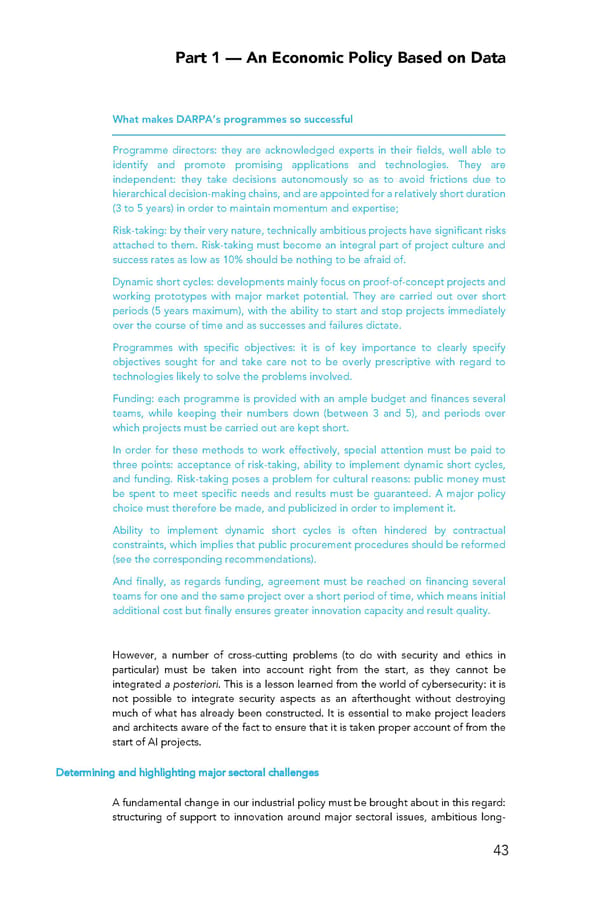Part 1 — An Economic Policy Based on Data What makes DARPA’s programmes so successful Programme directors: they are acknowledged experts in their fields, well able to identify and promote promising applications and technologies. They are independent: they take decisions autonomously so as to avoid frictions due to hierarchical decision-making chains, and are appointed for a relatively short duration (3 to 5 years) in order to maintain momentum and expertise; Risk-taking: by their very nature, technically ambitious projects have significant risks attached to them. Risk-taking must become an integral part of project culture and success rates as low as 10% should be nothing to be afraid of. Dynamic short cycles: developments mainly focus on proof-of-concept projects and working prototypes with major market potential. They are carried out over short periods (5 years maximum), with the ability to start and stop projects immediately over the course of time and as successes and failures dictate. Programmes with specific objectives: it is of key importance to clearly specify objectives sought for and take care not to be overly prescriptive with regard to technologies likely to solve the problems involved. Funding: each programme is provided with an ample budget and finances several teams, while keeping their numbers down (between 3 and 5), and periods over which projects must be carried out are kept short. In order for these methods to work effectively, special attention must be paid to three points: acceptance of risk-taking, ability to implement dynamic short cycles, and funding. Risk-taking poses a problem for cultural reasons: public money must be spent to meet specific needs and results must be guaranteed. A major policy choice must therefore be made, and publicized in order to implement it. Ability to implement dynamic short cycles is often hindered by contractual constraints, which implies that public procurement procedures should be reformed (see the corresponding recommendations). And finally, as regards funding, agreement must be reached on financing several teams for one and the same project over a short period of time, which means initial additional cost but finally ensures greater innovation capacity and result quality. However, a number of cross-cutting problems (to do with security and ethics in particular) must be taken into account right from the start, as they cannot be integrated a posteriori. This is a lesson learned from the world of cybersecurity: it is not possible to integrate security aspects as an afterthought without destroying much of what has already been constructed. It is essential to make project leaders and architects aware of the fact to ensure that it is taken proper account of from the start of AI projects. Determining and highlighting major sectoral challenges A fundamental change in our industrial policy must be brought about in this regard: structuring of support to innovation around major sectoral issues, ambitious long- 43
 For a Meaningful AI - Report Page 43 Page 45
For a Meaningful AI - Report Page 43 Page 45